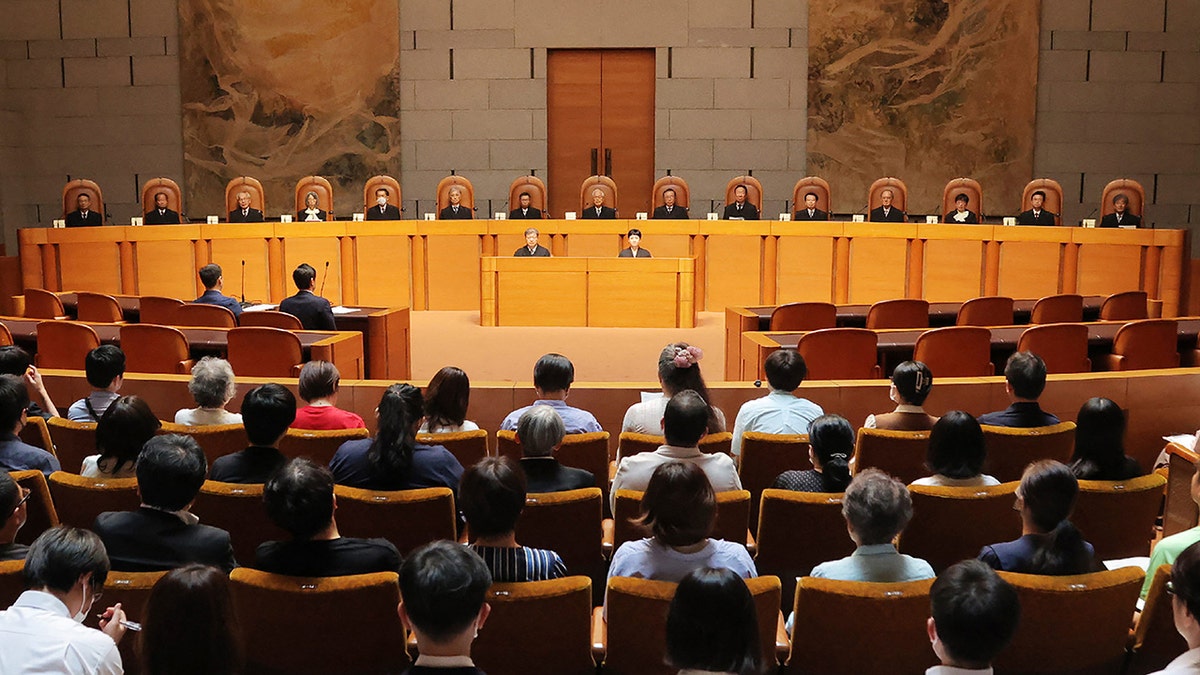Fox News Flash top headlines for October 25
Fox News Flash top headlines are here. Check out what's clicking on Foxnews.com.
Japan’s Supreme Court struck down a law requiring transgender people to remove their reproductive organs in order to officially change their gender.
On Wednesday, the top court’s 15-judge Grand Bench ruled that Japan’s 2003 law requiring the removal of reproductive organs for a state-recognized gender change, a practice long criticized by international rights and medical groups, is unconstitutional, according to Kyodo News.
The law required transgender people who want to have their biologically-assigned gender changed on family registries and other official documents to be diagnosed as having Gender Identity Disorder and undergo an operation to remove their reproductive organs.
The plaintiff, who is only identified as a resident in western Japan, originally filed the request in 2000, saying the surgery requirement forces a huge burden economically and physically and that it violates the constitution's equal rights protections.
JAPANESE LGBTQ ACTIVISTS URGE GOVERNMENT TO ENACT ANTI-DISCRIMINATION LAW

This picture taken on Sept. 27, 2023, shows Japan's Supreme Court Chief Justice Saburo Tokura and others giving arguments in the gender change case at the Supreme Court Grand Chamber in Tokyo. Japan's top court said Wednesday that requiring transgender people to be sterilized in order to change their legal gender was unconstitutional. (STR/JIJI PRESS/AFP via Getty Images)
The case was filed when the plaintiff requested a gender change in her family registry — to female from her biologically assigned male — and was turned down by lower courts.
The special law that took effect in 2004 states that people who wish to register a gender change must have their original reproductive organs, including testes or ovaries, removed and have a body that "appears to have parts that resemble the genital organs" of the new gender they want to register with.
The court’s ruling now requires the government to revise the law, effectively paving the way for transgender people to change their genders on official documents without surgery.

Participants of Tokyo Rainbow Parade 2023 pose for a photo with LGBTQ+ flags and rainbow face masks. Japan is the only member of the G-7 countries where same-sex marriage is not legal. (Stanislav Kogiku/SOPA Images/LightRocket via Getty Images)
Other details of the decision were not immediately available
Rights groups and the LGBTQ+ community in Japan have been hopeful for a change in the law after a separate case at a local family court accepted a transgender male's request for a gender change without the compulsory surgery, saying the rule is unconstitutional.
JAPAN FIRES AIDE FOR ANTI-LGBTQ COMMENTS: 'OUTRAGEOUS'
In yet another case, the Supreme Court found the ongoing law constitutional in 2019 after the case was filed by a transgender male seeking a gender registration change without the required sexual organ removal and sterilization surgery.
In that ruling, the top court said the law was constitutional because it was meant to reduce confusion in families and society, though it acknowledged that it restricts freedom and could become out of step with changing social values and should be reviewed later.

Japan's Supreme Court ruled Wednesday that a law forcing transgender people to have their reproductive organs removed in order to officially change their gender is unconstitutional. (Kyodo News via AP)
The Japanese government sticks to traditional paternalistic family values and has not been quick to accept sexual and family diversity.
CLICK HERE TO GET THE FOX NEWS APP
Hundreds of municipalities issue and accept partnership certificates for same-sex couples to ease hurdles in renting apartments and other areas, but they are not legally binding.
Japan remains the only Group of Seven member that does not allow same-sex marriage or legal protections. Many LGBTQ+ people still hide their sexuality due to fear of discrimination at work and schools.
The Associated Press contributed to this report.

